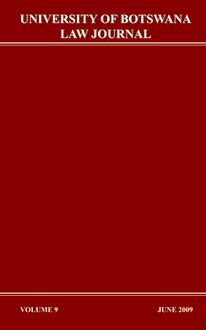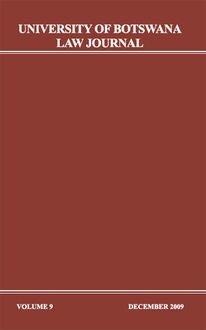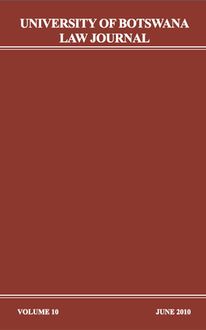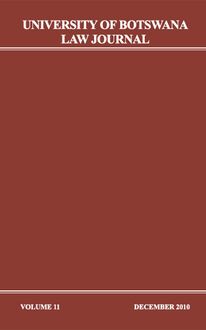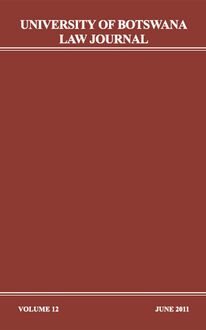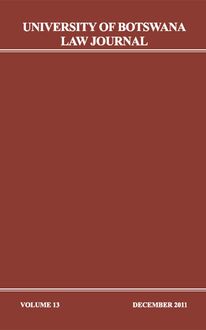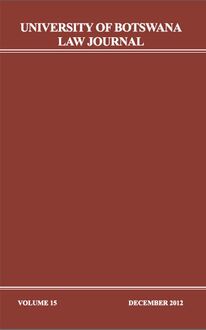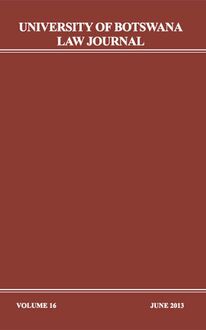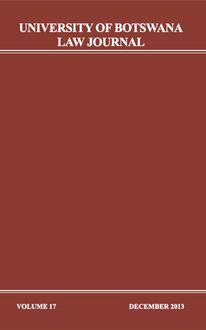Publié par
Nombre de lectures
5
Langue
English
Poids de l'ouvrage
4 Mo
The University of Botswana Law Journal is a peer refereed journal published twice a year. It provides a forum for scholars and practitioners to reflect on diverse legal issues of national, regional and international significance and of local and regional relevance.PatronThe Hon. Justice Nganunu, Chief Justice of BotswanaInternational Editorial Advisory BoardProf. D. D. N. Nsereko, Judge, International Criminal Court, The Hague, The NetherlandsProf. W. Du Plessis Faculty of Law, North-West University (Potchefstroom Campus), South Africa Prof. T. Maluwa H. Laddie and Linda P. Montague Professor of Law, Dickinson School of Law, Penn. State University, USA Prof. M. Reisman Myres McDougal Professor of Law, Yale Law School, New Haven, USA Prof. K. Frimpong Ghana Institute of Management and Public Administration, (GIMPA), Accra, Ghana Prof. S. Roberts Department of Law, London School of Economics, United Kingdom Prof. A. McCall Smith Edinburgh Law School, University of Edinburgh, United Kingdom Prof. C. Forsyth Faculty of Law, Robinson College, University of Cambridge, United Kingdom Prof. B. Othlogile Vice Chancellor, University of Botswana Dr. A. Molokomme Attorney-General, BotswanaEditorial BoardProf. Peter Takirambudde Editor-in-Chief, University of BotswanaMrs. E. Macharia-Mokobi Secretary, University of BotswanaDr. K. Solo University of BotswanaProf. C. Ngongola University of BotswanaProf. J. Kiggundu University of BotswanaProf. E. K. Quansah University of BotswanaDr. O. B. Tshosa University of BotswanaMr. T. Sebego Vice chairman, Law Society of Botswana
Voir
UNIVERSITY OF BOTSWANA LAW JOURNAL The University of Botswana Law Journal is a peer refereed journal published twice a year. It provides a forum for scholars and practitioners to reflect on diverse legal issues of national, regional and international significance and of local and regional relevance. PATRON The Hon. Justice Nganunu, Chief Justice of Botswana. INTERNATIONAL EDITORIAL ADVISORY BOARD Prof. D. D. N. Nsereko, Judge,InternationalProf. S. Roberts Criminal Court, The Hague, The Netherlands Department of Law, London School of Economics, United Kingdom. Prof. W. Du Plessis Faculty of Law, North-West UniversityProf. A. McCall Smith (Potchefstroom Campus), South Africa. Edinburgh Law School, University of Edinburgh, United Kingdom. Prof. T. Maluwa H. Laddie and Linda P. Montague Professor of Law,Prof. C. Forsyth Dickinson School of Law, Penn. State University, Faculty of Law, Robinson College, University of USA. Cambridge, United Kingdom.
Prof. M. Reisman Myres McDougal Professor of Law, Yale Law School, New Haven, USA.
Prof. K. Frimpong Ghana Institute of Management and Public Administration, (GIMPA), Accra, Ghana
EDITORIAL BOARD
Prof. Peter Takirambudde Editor-in-Chief, University of Botswana.
Mrs. E. Macharia-Mokobi Secretary, University of Botswana.
Dr. K. Solo University of Botswana.
Prof. C. Ngongola University of Botswana.
Prof. J. Kiggundu University of Botswana.
Prof. E. K. Quansah University of Botswana.
Dr. O. B. Tshosa University of Botswana.
Mr. T. Sebego Vice chairman, Law Society of Botswana
Prof. B. Othlogile Vice Chancellor, University of Botswana.
Dr. A. Molokomme Attorney-General, Botswana.
SUBMISSIONS
All correspondence concerning articles and other submissions should be addressed to:
The Editor-in-Chief University of Botswana Law Journal Department of Law University of Botswana Private Bag UB 00705 Gaborone Botswana
Email submissions: ublj@mopipi.ub.bw Guidelines on the preparation and submission of articles and other contributions can be found on the inside back cover of each issue. More detailed guidelines will be supplied on request.
SUBSCRIPTIONS All business correspondence, including orders and remittances relating to subscriptions as well as advertising should be addressed to the Editor-in-Chief. SUBSCRIPTION RATES(All rates include postage) Annual institutional rate Annual individual rate (Africa) P 280 (US $50). (Africa) P 100 (US $ 20)
Annual institutional rate (Europe and America) P 400 (US $80)
Annual individual rate (Europe and America) P 200 (US $40)
The mode of citation of this Journal is: 11 UBLJ (2010) ©UBLJ, 2010. All rights reserved. No part of this publication may be reproduced, stored in a retrieval system, or transmitted in any form or by any means, electronic, mechanical, photocopying, recording, scanning or otherwise, without the written permission of the publisher. ISSN 1817-2733
THE W ORLD BANK W ashington, D.C.
UNIVERSITY OF BOTSWANA LAW JOURNAL
VOLUME 11 DECEMBER 2010
ARTICLES
Foreign Aid, the Rule of Rule of Law, and Economic Development.........3 in Africa N.A.Curott
Paradigm Shifts in International Justice and the Duty to Protect: ............19 In Search of an Action Principle P. Glen
The Right to Maternal Health Care: Developing International ................39 Human Rights Law to Prevent Maternal Mortality L. S. Johnson
Between Judicial Enabling and Adversarialism: The Role of ..................81 the Judicial Officer in Protecting the Unrepresented Accused in Botswana in a Comparative Perspective R.J.V. Cole
Competition and Regulation in the Gold Industry:.................................117 An American Perspective J. Wilkerson
Procurement Law in Nigeria: Challenge for Attainment........................131 of its Objectives O.A. Jacob
COMMENTS
Principled Leadership: Finding Common Ground Among.....................153 Divergent Philosophies V.D. Lopez JD
MTN & Airtel’s African Tryst: The Legal Angle ..................................159 S.V. Adithya Vidyasagar
Limits of Fair Dealing with Literary Works in India..............................169 A. Goel
2 UNIVERSITY OF BOTSWANA LAW JOURNAL DECEMBER 2010
Lesotho
Zimbabwe
RECENT LEGAL DEVELOPMENTS
--
-
Q. Letsika.....................................177 L. Kometsi
J. Pfumorodze..............................185
ARTICLES
3
Foreign aid, the rule of law, and economic development in Africa
ABSTRACT
N.A. Curott*
Foreign aid has failed to bring about any significant development results in the poor countries of Africa in over sixty years of existence. The failure of aid is due to the fact that development planning faces an insurmountable calculation problem. Attempting to salvage aid by making it more selective does not address this problem, and will not make aid effective. Aid by its very nature causes waste, corruption, politicization, privilege seeking, and statism, all of which are detrimental to economic development. Instead of relying on aid, African economies should occupy themselves with creating legal institutions that are commensurate with the protection of private property and the Rule of Law, which are foremost among the institutions necessary for sustainable, long run economic growth.
1.
INTRODUCTION
In the sixty years since its inception, foreign aid has failed to bring about any significant economic development in the poor countries of Africa. This fact has caused many analysts to criticize the internal workings of foreign aid administration in recent years, but they rarely question the actual potential of foreign aid to lift poor countries out of poverty. Instead, the political establishment calls for ever more aid: The United Nations recommended in January of 2005 that the total amount of aid to Africa should be doubled by 1 2010, while Official Development Assistance from the U.S. to Africa has 2 tripled since President Bush took office in 2001, and it is likely that the new Millennium Challenge Account will increase cash grants to poor African countries. British Prime Minister Tony Blair has recently been a leading champion of foreign aid and debt forgiveness, and advocates doubling aid to Africa. The strategy of the IMF and the World Bank for development also 3 includes increasing the flow of aid to developing countries. It is widely
*
1
2 3
Mercatus Center at George Mason University, 4400 University Drive, Fairfax, VA U.S. ncurott@gmu.edu. UN Millennium Project,Investing in Development: A Practical Plan to Achieve the Millennium Development Goals(New York: United Nations Development Programme, 2005). International Development Statistics, http://oecd.org. Global Monitoring Report 2006: Millennium Development Goals: Strengthening Mutual Accountability, Aid, Trade, and Governance(World Bank Publications, 2006).
4 UNIVERSITY OF BOTSWANA LAW JOURNAL DECEMBER 2010
believed by policy makers that increasing foreign aid will achieve the millennium development goal of a fifty percent reduction in poverty by 2015. The widespread advocacy of foreign aid is remarkable considering its failure to produce any sustained development in the past. This study investigates whether the new round of foreign aid spending is likely to be effective at reducing poverty in Africa, and finds that both economic history and economic reasoning suggest that it will not. The article then considers what alternatives exist to foreign aid. Since the protection of private property and the Rule of Law are foremost among the institutions necessary for sustainable, long run economic growth, the article concludes that those interested in the development of African economies should occupy themselves with creating legal institutions that are commensurate with the Rule of Law.
2.
THE FAILURE OF FOREIGN AID
Reducing poverty is a noble goal, but past experience shows that merely increasing foreign aid funding won’t bring about development, and may even impede it. Foreign aid’s track record is dismal, and economists no longer deny that Western development aid to Africa has been ineffective. The prevailing consensus among economists is that previous aid policies have not worked very well. Approximately $568 billion in foreign aid has been poured into 4 Africa, with little development to show for it. Countries that were given the most aid, including Liberia and Somalia, have actually experienced negative 5 economic growth. Income per capita throughout Africa has completely 6 stagnated since the inception of foreign aid. Thus many analysts have come to 7 question the effectiveness of aid in the first place. Still, the political establishment generally calls for more foreign aid. They argue that foreign aid is necessary for three reasons – (1) it promotes the 8 political interests of the givers, (2) it is necessary for providing humanitarian relief in times of emergency, and (3) it is necessary for eliminating poverty. The first two justifications of foreign aid, while perhaps relevant, are beyond
4
5
6 7
8
W. Easterly,Freedom versus Collectivism in Foreign Aid, in J. Gwartney and R. Lawson,Economic Freedom of the World: 2006 Annual Report34 (Fraser Institute, 2006). World Bank, World Development Indicators Online, http://www.worldbank.org. In the case of Somalia there is evidence that conditions have actually improved since the complete collapse of the national government in 1991. See B. Powell, R. Ford and A. Nowrasteh,Somalia After State Collapse: Chaos or Improvement? Independent Review Working Paper Number 64. Ibid. See, for example, J. Morton,The Poverty of Nations: The Aid Dilemma at the Heart ofAfrica (British Academic Press, 1994). A large portion of foreign aid has always been earmarked for the advancement of Western political interests, in particular toward stopping the spread of communism. See P. T. Bauer,The Development Frontier: Essays in Applied Economic(Harvard University Press, 1991) p. 42. More recently, foreign aid is being used in an attempt to prevent terrorism. See USAID,Policy Framework for Bilateral Foreign Aid (2006) for the current US policy on bilateral foreign aid.
FOREIGN AID, THE RULE OF LAW AND ECONOMIC DEVELOPMENT IN AFRICA 5
the scope of this investigation, which deals with the effectiveness of foreign aid in bringing about economic growth and prosperity for those countries 9 which receive it. The elimination of poverty requires the higher levels of income that come with economic growth and development, and the best hope for the impoverished masses in the third world to improve their well being lies in economic growth. The reason is that economic development is essential to human welfare. Although well-being is a subjective concept that cannot itself be measured, proxies such as income, life expectancy, educational opportunities, literacy, and nutrition can serve as reasonable estimates. Statistical studies show that economic development is a very significant factor in determining 10 many desirable well-being indicators. A productive economy is necessary for creating an environment in which individuals are capable of developing their faculties and can peacefully pursue meaningful and fulfilling lives. One should ultimately ask, then, does foreign aid “work?” Is foreign aid capable of lifting poor countries up out of a cycle of poverty, onto a higher plain of economic development? Economic reasoning and historical evidence suggest that the answer to this question is a resounding “no.”
A.
Foreign Aid is Not Necessary for Development
The original economic argument for foreign aid was that third world 11 development would be impossible without it. This line of thinking holds that people in under-developed countries are simply too poor to save any money, so they never have a pool of funds available for creating the capital formation that is necessary for economic development. According to this view, foreign aid can help them break out of this trap and get on the path to sustainable long-term economic growth by providing the funds necessary for capital investment. The facts of history, however, strongly refute the notion that poor countries need foreign aid to break out of poverty. For starters, the first nations to develop, such as England, achieved economic growth and development without foreign aid. If foreign aid were really necessary for
9
10
11
It should be noted, however, that although humanitarian assistance programs are usually defended on the grounds that they have intrinsic humanitarian value, in the long run they often create more problems than they solve. Even a program as seemingly unobjectionable as food aid has had many unintended but harmful consequences in Africa, including disrupting local markets and putting local producers out of business. See J. Bovard,The Continuing Failure of Foreign Aid, Cato Policy Analysis No. 65 (1986); D. Osterfeld,Prosperity Versus PlanningUniversity Press 1992) p. 142. More importantly, even (Oxford when successful, humanitarian assistance programs are only temporary alleviations for those in extreme need. They do nothing to fix the underlying problem, which is the human suffering associated with extreme poverty. See P. J. Boettke & J. R. Subrick,Rule of Law, Development and Human Capabilities, 10 Supreme Court Economic Review 109 (2002). This theory, known as the “vicious cycle of poverty,” is still the leading justification for foreign aid today. Economist Jeffrey Sachs is now its leading proponent; see J. D. Sachs, The End of Poverty: How We Can Make it Happen in Our Lifetime(Penguin Books, 2005). For a refutation of this poverty trap theory see P. T. Bauer,Dissent on Development(Harvard University Press, 1972) pp. 31-38.
6 UNIVERSITY OF BOTSWANA LAW JOURNAL DECEMBER 2010
development, then no country could have developed to begin with. Then there are also many recent examples of countries, such as South Korea and Taiwan, which began to develop only after they stopped receiving large-scale 12 economic aid. Moreover, examination of the relevant data also undercuts the theory that foreign aid is necessary for economic development. Recent studies have taken to task conventional foreign aid wisdom, as represented by the “Financing Gap” approach. Developed by World Bank economists, the “Financing Gap” approach assumes that the amount of economic growth a 13 country experiences is proportional to the level of investment. Thus, if poor countries are not investing enough to achieve a target output, foreign aid could make up for the shortfall, ensuring enough investment for economic growth. Experience has failed to validate the assumptions of the “Financing Gap” approach. A number of empirical studies show that there is no statistical 14 correlation between economic growth and official levels of investment. This finding implies that foreign aid for investment is not a sufficient condition for economic growth. Furthermore, in countries where economic growth has occurred, only six percent had increased the amount of investment by the amount required according to the finance gap models. This casts serious 15 doubts on any simplistic model relating economic growth to investment. Additionally, dozens of econometric studies on the relationship between foreign aid and economic growth reveal no conclusive evidence that the level 16 of aid is correlated with the amount of growth in recipient countries.
B.
Why Aid is Ineffective and Harms its Recipients
Studies of economic data and statistics have resoundingly shown that foreign aid has not brought about the expected economic growth in recipient countries. One must now ask, why hasn't foreign aid worked? Indeed, can foreign aid work, within the constructs of economic reasoning? A vast body of literature tells us no, and for the following reasons. First, foreign aid handouts are not subject to the “market test” of profit and loss,thus they are wasted rather than being put to productive use. Second, foreign aid creates “perverse incentives,”
12 13
14
15
16
M. Krauss,Development without Aid(New Press, 1983) p. 190. See W. Easterly,The Elusive Quest for Growth: Economists’ Adventures and Misadventures in the Tropics(MIT Press, 2001) pp. 28-37. Ibid., 39-42; M. Blomstomet al.,Fixed Investment the Key to Economic Growth?, Is 111 Quarterly Journal of Economics 269 (1996). See Easterly, note 13 above, p. 40. This isn’t to say that investment in capital isn’t crucial for economic development. What is important is the right kind of investment, which government aid programs lack the knowledge and incentive to provide. Easterly goes too far in rejecting the importance of investment altogether. A number of recent studies have found that aid fails to systematically improve growth rates. See P. Boone,Politics and the Effectiveness of Foreign Aid, 40 European Economic Review 289 (1996); I. Vasquez,Official Assistance, Economic Freedom, and Policy Change: Is Foreign Aid Like Campagne?, 18 Cato Journal 275 (1998); T. Ovaska,The Failure of Development Aid, 23 Cato Journal 175 (2003).
FOREIGN AID, THE RULE OF LAW AND ECONOMIC DEVELOPMENT IN AFRICA 7
entirely antithetical to economic growth and development, amongst those who receive it. Finally, foreign aid, by subsidizing corrupt regimes, empowers dictators and begets increased corruption and repression of the poor masses it aims to help. Despite its noble intentions, foreign aid is doomed to failure for these systemic reasons, which shall now be examined in further detail.
Foreign Aid Lacks Market Signals
Under market capitalism, entrepreneurs evaluate possible investment projects 17 on the basis projected return- “i.e.”, will the investment be profitable? Entrepreneurs stake their own funds, or borrowed funds for which they are ultimately liable, on these investments, thus they have strong incentive to “get it right,” “i.e.” to avoid bad investments that won't pay off. Of course, entrepreneurs can and do fail in this regard; they frequently lose money in what turn out to be unprofitable investments and face the prospect of going out of business. Entrepreneurs who repeatedly fail will ultimately lose their funding, whether it be their own money, bank credit, or shareholders' equity. In general, successful entrepreneurs, those who do the best job of satisfying consumers and thereby winning their business, are rewarded with profits, and unsuccessful entrepreneurs, who waste resources, are “fired” by the consumers. In contrast, the bureaucrats and government officials responsible for “investing” foreign aid dollars face no such market test, and hence have no 18 such incentive to make the best investment choices. As long time aid practitioner Thomas Dichter has noted: “Whereas a large corporation cannot lose money forever without facing some consequences, the aid industry has gone on for 60 years with hardly anything to show for the two trillion dollars it has spent (something it does not really bother to deny), and yet it is still very 19 much in business.” The primary incentive of World Bank bureaucrats is to spend as much money as possible, not to ensure it is effectively spent. Consequently, billions of dollars have been siphoned into inefficient, and unproductive, and capital-intensive projects such as the construction of damns, 20 oil refineries, airports, and crop-storage depots. Many of these projects are unsustainable, and have to be abandoned. A 2000 report found that 73 percent of the projects undertaken in Africa that year by the World Bank were not even
17
18
19
20
For a more detailed explanation of the entrepreneur’s role in the market economy, see I. Kirzner, Competition and Entrepreneurship(University of Chicago Press, 1973). For an explanation of the different incentives that private and public decision makers face, see L. V. Mises,Bureaucracy(Yale University Press, 1944). T. Dichter,Time to Stop Fooling Ourselves about Foreign Aid: A Practitioner’s View, Cato Institute Foreign Policy Briefing No 86 (2005). See D. Osterfeld, note 9 above, p, 150; G. B. N. Ayittey,Aid For Black Elephants: How Foreign Assistance Has Failed Africa,in D. Bandow & I. Vasquez ed.,Perpetuating Poverty (Cato Institute, 1994).
8 UNIVERSITY OF BOTSWANA LAW JOURNAL DECEMBER 2010
21 a success by their own standards. Investments in education and AIDS 22 prevention have been equally ineffective. No matter how noble the intentions, nor how vast the pocketbook of the foreign aid establishment, it cannot get around the fact that it lacks the discipline imposed by the profit and loss test. In fact, without the information generated by market price signals, 23 there is no way to make rational choices about where to allocate resources. In the absence of property ownership and the competitive process of market exchange, it is impossible to determine the true opportunity cost of investment decisions. Thus it should come as no surprise that the vast majority of foreign aid dollars are wasted. Development planners face a fundamental and unsolvable economic calculation problem. And since there is no telling whether foreign-aid funded investments make economic sense, how can anyone expect foreign aid to yield economic growth?
Foreign Aid Perverts the Incentive Structure of Recipients
Not only has the foreign aid establishment largely ignored this “market test” idea, but they have ignored the broad incentive structure that foreign aid creates for the government and the people in recipient countries. Foreign aid amounts to a subsidization of poverty in third-world countries, and when you subsidize something, you get more of it. To be a well-qualified candidate for foreign aid payments, a country must be full of impoverished people and show weak or non-existent economic growth. Yet foreign aid payments do not go into the hands of the impoverished masses, they go into the hands of government officials, who then decide how the money is spent. Thus government officials have little incentive to enact policies amenable to economic growth, and much incentive to retain the status quo ante of grinding poverty, in order to show their rich Western benefactors that they need ever greater foreign aid handouts. In addition, foreign aid has enabled many African governments to engage in policies harmful to growth, such as economic regulations, confiscation of 24 property, and suppression of trade. Perhaps the most pernicious effect of foreign aid is that the moneyhas been used by ruthless and tyrannical dictators 25 in Africa to suppress their own people. These are long-standing policies and cannot be attributed to mistakes on the part of well-intentioned governments. They are defects inherent in the aid system itself.
21
22 23
24 25
International Financial Institution Advisory Commission (Meltzer Commission),Report to the U.S. Congress and the Department of the Treasury(March 8, 2000). See Easterly, note 13 above. The Austrian economist Ludwig von Mises was the first to explain why market prices are necessary for rational economic calculation. See L. V. Mises,Economic Calculation in the Socialist Commonwealth,in F. A. Hayek, ed.,Collectivist Economic Planning(G. Routledge & Sons, 1935). See Bauer, note 8 above, p. 46. See G. B. N. Ayittey,Africa in Chaos(St. Martin’s Press, 1998); M. Maren,Road to Hell: The The Ravaging Effects of Foreign Aid and International Charity(Free Press, 2002).
FOREIGN AID, THE RULE OF LAW AND ECONOMIC DEVELOPMENT IN AFRICA 9
Foreign aid also harms it recipients by creating perverse incentives for ordinary workers. The impoverished masses, in order to have a shot at participation in the foreign aid bonanza, have strong incentives to align themselves with the political factions that have control of the money. Thus it comes as no surprise that many poor African countries are characterized by an 26 unusually high intermingling of private and political life. Aid puts more resources at the disposal of the governments, and therefore increases its power vis-à-visthe rest of society. One consequence is that peoples’ affairs tend to 27 be diverted from economic activity (“i.e.” wealth creation) to politics. This undermines the productivity of an economy because resources are shifted 28 from productive activity into seeking political favor and privileges. Enormous sums of money have also been lost because of the 29 widespread corruption in African governments. And even worse, aid actually promotes corruption by providing resources that are fought over by 30 interest groups and factions. If the only downside to aid were that much of it is lost and wasted, perhaps it would still be desirable. After all, some aid is better than none. But aid has had many deleterious effects in the recipient countries. The very term “aid” is misleading because it implies that it actually helps the recipients. In this way it prejudices debate in the favor of more aid. In actuality aid is a government-to-government subsidy, and must be judged by the overall effects that this subsidy produces. Aid does not go directly to the impoverished African masses. In the long run it will only help the poor if it leads to development, which, as we have seen, it has not, and indeed cannot in the light of economic reasoning.
C.
The New Debate on Foreign Aid
The combination of waste, corruption, and rent seeking all combine to explain why aid has not contributed to economic growth. The manifest failure of aid programs to achieve their intended goals and the corruption they have engendered has caused the World Bank to recognize the importance of the
26
27
28
29
30
Bauer long contended that aid increases the size and scope of recipient governments, contributes to the politicization of life, and is an anti-market force. See, for example, Bauer, note 8 above. A statistical examination of the relationship between economic freedom and the amount of development aid is treated in B. Powell and M. Ryan,Development Aid and Economic Freedom: Are they Related? Forthcoming, Journal of Private Enterprise. See W. Baumol,Entrepreneurship: Productive, Unproductive, and Destructive 98 Journal of Political Economy 893 (1990). In economics, the process by which individuals attempt to gain through manipulation of the political environment instead of through trade and the production of added wealth is called rent seeking. This idea was first developed in G. Tullock,The Welfare Costs of Tariffs, Monopolies, and Theft, 5 Western Economic Journal 224 (1967). The term rent seeking was introduced by A. O. Krueger,The Political Economy of the Rent-Seeking Society, 64 American Economic Review 291 (1974). For a general account of corruption in Africa, see J. M. Mbaku,Bureaucratic and Political Corruption in Africa: The Public Choice Perspective(Krieger Publishing Company, 2000). See J. Svensson,Foreign Aid and Rent-Seeking, 51 Journal of International Economics, 437 (2004); A. Alesina & B. Weder,Do Corrupt Governments Receive Less Foreign Aid?,American Economic 92 Review 1126 (2002).
